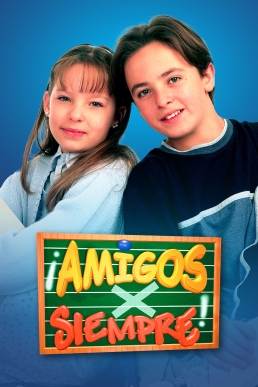Related Research Articles

Clase 406 is a Mexican telenovela produced by Pedro Damián for Televisa, broadcast by Canal de las Estrellas. It is a remake of the Colombian telenovela Francisco, El Matemático (1999). Clase 406 originally aired from Monday, July 1, 2002, to Friday, October 31, 2003. The story deals with the problems of newer Latino youth, in general like sex, drug dealing, abuse, drinking, rape, deception, and heartbreak.
Mi pequeña Soledad is a Mexican telenovela produced by Verónica Castro for Televisa in 1990.

Amigas y rivales is a Mexican juvenile telenovela produced by Emilio Larrosa for Televisa in 2001. On Monday, February 26, 2001, Canal de las Estrellas started broadcasting Amigas y rivales weekdays at 7:00pm, replacing Primer amor, a mil por hora. The last episode was broadcast on Friday, November 9, 2001 with El juego de la vida replacing it the following Monday.

Amigos x siempre is a Mexican children's telenovela produced by Rosy Ocampo for Televisa that premiered on January 10, 2000 and ended on June 16, 2000. The story is set at a prestigious, but rigid and repressive school called Instituto Vidal, where a group of children from a variety of backgrounds form a special friendship, using music as their bond. It stars Adriana Fonseca, Ernesto Laguardia, Martín Ricca, Carmen Montejo, Odiseo Bichir, Rebecca Mankita, Héctor Ortega and Belinda.

Corazones al límite is a Mexican telenovela produced by Roberto Hernández Vázquez for Televisa in 2004.

María Mercedes is a Mexican telenovela produced by Valentín Pimstein for Televisa in 1992. It was the first of the "Marías" telenovela trilogy, being followed by Marimar and María la del Barrio. María Mercedes is a remake of the telenovela Rina, which in turn is based on the radionovela Enamorada by Inés Rodena.

Te Voy a Enseñar a Querer is a Spanish-language telenovela produced by the United States-based television network Telemundo and RTI Colombia. This limited-run series ran for 129 episodes from August 31, 2004 to March 14, 2005.

Cuidado con el ángel is a Mexican telenovela produced by Nathalie Lartilleux for Televisa in 2008. It is an adaptation of the Venezuelan telenovela, Una muchacha llamada Milagros produced in 1974 by Venevisión. Each episode garnered nearly 5 million viewers daily.

Pobre niña rica is a Mexican telenovela produced by Enrique Segoviano for Televisa.
Alondra is a Mexican telenovela produced by Carla Estrada for Televisa in 1995. The story based on Casandra created by Yolanda Vargas Dulché. For personal reasons Yolanda Vargas Dulché changed the name of Casandra to Alondra in honor of her granddaughter Alondra de la Parra. It stars Gonzalo Vega, Ana Colchero and Ernesto Laguardia.

Tres mujeres is a Mexican telenovela produced by Roberto Hernández Vázquez for Televisa in 1999-2000. When it came out it was such a success that they added 3x the normal amount of chapters. There are 280 Chapters when there are normally about 100 chapters. The Telenovela ended in 2000, which made it the longest Telenovela produced by Televisa until Clase 406.
Yesenia is a Mexican telenovela produced by Irene Sabido for Televisa in 1987. The protagonists of this telenovela were Adela Noriega and Luis Uribe, while Noe Murayama starred as antagonist.

Valeria y Maximiliano is a Mexican telenovela produced by Carlos Sotomayor for Televisa in 1991.
Lo blanco y lo negro is a Mexican telenovela produced by Ernesto Alonso for Televisa in 1989.
Cautiva is a Mexican telenovela produced by Francisco Burillo for Televisa in 1986. It starred Julio Alemán, Lucy Gallardo, Otto Sirgo, Magda Guzmán, Claudia Córdova and Cecilia Toussaint.
El engaño is a Mexican telenovela produced by Ernesto Alonso for Televisa in 1986. It is an original story by Caridad Bravo Adams, adapted by Fernanda Villeli and directed by Sergio Jiménez.
La fuerza del amor is a Mexican telenovela produced by Gonzalo Martínez Ortega for Televisa in 1990.

Mi adorable maldición is a Mexican telenovela produced by Ignacio Sada. It is an adaptation of the Colombian story written by Julio Jiménez titled Lola Calamidades, which most recent version, Bella Calamidades, starred Danna García. The series is adapted for television by Gabriela Ortigoza and directed by Sandra Schiffner, Eduardo Said and Martha Montufar. It premiered on January 23, 2017, and ended on July 9, 2017. A total of 120 episodes were initially confirmed. but the show ran for 121 episodes.

Las Malcriadas is a Mexican telenovela produced and directed by Joshua Mintz for TV Azteca. It is an original story by Ximena Escalante and written by César Sierra and Carlos Madrid and directed by Mintz, Moisés Urquidi and Raúl Caballero. It stars Sara Maldonado as the titular character. Production started on June 28, 2017 and it premiered on September 18, 2017.
References
- ↑ "La sonrisa del Diablo" (in Spanish). alma-latina.net. Archived from the original on August 5, 2011. Retrieved February 25, 2016.
- ↑ Angélica Rivera (May 21, 2014). "Rebecca Jones y sus escenas más candentes" (in Spanish). El Gráfico. Retrieved July 21, 2014.